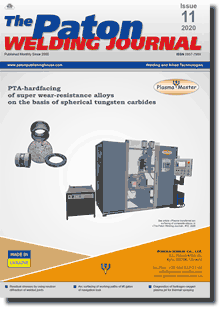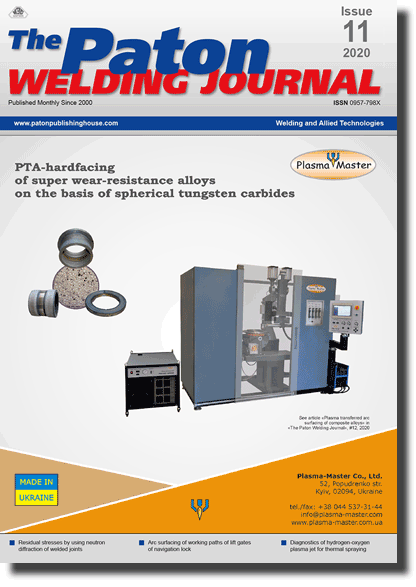| 2020 №11 (07) |
DOI of Article 10.37434/tpwj2020.11.08 |
2020 №11 (01) |

The Paton Welding Journal, 2020, #11, 36-40 pages
Diagnostics of hydrogen-oxygen plasma jet for application in thermal spraying
Yu.S. Popil1, V.M. Korzh1, V.Ya. Chernyak2 and Ye.A. Zakharov1
1NTUU «Igor Sikorsky Kyiv Polytechnic Institute» 37 Peremohy Prosp., Kyiv, Ukraine, E-mail: Popil_kpi@ukr.net
2Taras Shevchenko National University of Kyiv 4g Akademik Glushkov Prosp., 03187, Kyiv, Ukraine
Abstract
The problem of obtaining a low-temperature plasma jet, where the plasma-forming gas is a hydrogen-oxygen mixture produced by electrolysis-water generators, was considered. The aim of the work is to determine the size of the active zone of the jet, along the length of which the melting and heating of the particle takes place, and to control it by changing the nature of the flow. In the course of diagnosing the plasma jet, the distribution of temperature, velocity and effective thermal power depending on the nature of the jet flow was determined. It was determined that the sizes of the active zone of the plasma jet can be 1.4 times larger at a laminar nature of the flow than at a turbulent one. The maximum temperature is observed in the arc part of the plasmatron and amounts to 8400 ± 1000 K, in the jet of hydrogen-oxygen plasma the average temperature is 5000 ± 500 K. Taking into account the results of the diagnostics, the material for plasma spraying and distance can be chosen. 19 Ref., 1 Table, 2 Figures.
Keywords: hydrogen-oxygen plasma jet, laminar, turbulent nature of flow, sizes of active zone of the jet, plasma spraying
Received 12.10.2020
References
1. Nikolaev, G.A., Olshansky, N.A. (1975) Special methods of welding. Moscow, Mashinostroenie [in Russian].2. Borisov, Yu.S. (1987) Thermal coatings from powder materials: Refer. Book. Kiev, Naukova Dumka [in Russian].
3. Korzh, V.M., Popil, Yu.S. (2010) Hydrogen-oxygen flame treatment of metals. Kiev, Ekotekhnologiya [in Russian].
4. By data of Companies LLC Multiplaz. http://www.multiplaz. ru/ OJSC Elion, Gorynych https://as-pp.ru/gorynych; http:// aspromt.ru/mppk-gorynych [in Russian].
5. Frolov, V.V. (1954) Physicochemical processes in welding arc. Moscow, Mashgiz [in Russian].
6. Dudko, D.Ya., Emets, Yu.P., Repa, I.I. (1981) Composition and electrophysical parameters of hydrogen-oxygen plasma. Teplofizika Vysokikh Temperatur, 19(4), 697–701 [in Russian].
7. Dautov, G.Yu., Uryukov, B.A. et al. (2004) Generation of low-temperature plasma and plasma technologies. In: Problems and Prospects. Novosibirsk, Nauka, 105–145 [in Russian].
8. Vargaftik, N.B. (1963) Reference book on thermophysical properties of gases and fluids. Moscow, Fizmatgiz [in Russian].
9. (1959) Browning. Plasma — a substitute for the oxy-fuel flame. Welding J., 9, 38.
10. Vasiliev, K.V., Isachenko, A.A. (1962) On application of plasma heating in welding processes. Trudy VNIIAVTOGEN, Issue 8 [in Russian].
11. Zhukov, M.F., Smolyakov, V.Ya., Uryukov, B.A. (1973) Electric arc heaters of gas (plasmatrons). Moscow, Nauka [in Russian].
12. Korzh, V.M., Popil, Yu.S., Popil, N.Yu., Moskalenko, D.B. (2015) Method of producing of hydrogen-oxygen plasma jet. Ukraine Pat. 107568, fill. 31.12.2015; publ. 10.06.2016; Int. Cl. H05H1/26, В23К 10/02, В23К 101/00 [in Ukrainian].
13. Paton, B.E., Gvozdetsky, V.S., Dudko, D.A. et al. (1979) Microplasma welding. Kiev, Naukova Dumka [in Russian].
14. Rykalin, N.N. (1985) High-temperature technological processes. Moscow, Nauka [in Russian].
15. Abramovich, G.N. (1969) Applied gas dynamics. Moscow, Fiz-Mat. Literatura [in Russian].
16. (1977) Optical pyrometer LOP-72: Certificate. Kharkov, Oblgrafizdat [in Russian].
17. Laux, C.O., Spence, T.G., Kruger, C.H., Zare, R.N. (2003) Optical diagnostics of atmospheric pressure air plasma. Plasma Sources Sci. Technol., 12, 2, 125-138. https://doi.org/10.1088/0963-0252/12/2/301
18. (1985) Electron-excited molecules in nonequilibrium plasma. Trudy FIAN. Moscow, Nauka [in Russian].
19. Pearse, R.W.B, Gaydon, A.G. (1976) The identification of molecular spectra. John Wiley & Sons, Inc., NewYork. https://doi.org/10.1007/978-94-009-5758-9
Suggested Citation
Yu.S. Popil, V.M. Korzh, V.Ya. Chernyak and Ye.A. Zakharov (2020) Diagnostics of hydrogen-oxygen plasma jet for application in thermal spraying. The Paton Welding J., 11, 36-40.The cost of subscription/purchase order journals or individual articles
| Journal/Currency | Annual Set | 1 issue printed |
1 issue |
one article |
| TPWJ/USD | 384 $ | 32 $ | 26 $ | 13 $ |
| TPWJ/EUR | 348 € | 29 € | 24 € | 12 € |
| TPWJ/UAH | 7200 UAH | 600 UAH | 600 UAH | 280 UAH |
| AS/UAH | 1800 UAH | 300 UAH | 300 UAH | 150 UAH |
| AS/USD | 192 $ | 32 $ | 26 $ | 13 $ |
| AS/EUR | 180 € | 30 € | 25 € | 12 € |
| SEM/UAH | 1200 UAH | 300 UAH | 300 UAH | 150 UAH |
| SEM/USD | 128 $ | 32 $ | 26 $ | 13 $ |
| SEM/EUR | 120 € | 30 € | 25 € | 12 € |
| TDNK/UAH | 1200 UAH | 300 UAH | 300 UAH | 150 UAH |
| TDNK/USD | 128 $ | 32 $ | 26 $ | 13 $ |
| TDNK/EUR | 120 € | 30 € | 25 € | 15 € |
AS = «Automatic Welding» - 6 issues per year;
TPWJ = «PATON WELDING JOURNAL» - 12 issues per year;
SEM = «Electrometallurgy Today» - 4 issues per year;
TDNK = «Technical Diagnostics and Non-Destructive Testing» - 4 issues per year.


